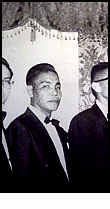Death and honor
Bury me at Arlington, Filipino vet pleaded
Augusto Roa Realuyo
After serving his adopted country, a Filipino-American war hero’s fondest wish was to be buried in Arlington National Cemetery.
But Augusto Roa Realuyo died in a Manhattan Veterans Affairs hospital last month at age 82 without the Army consenting to his request for a place at the nation’s premier military cemetery.
Yesterday, Realuyo’s family asked a Manhattan Federal Court to direct the Army to do so, citing his two tours of duty during World War II, his capture and internment by the Japanese and his participation in the infamous Bataan Death March.
“It is very distressing, but I had to do it,” Realuyo’s brother, Pompeo, 69, a lawyer, said of the lawsuit.
A law signed by then-President Bill Clinton in 2000 grants Filipino-Americans who served in World War II burial rights in national cemeteries, such as one in Pinelawn, Long Island, run by the Department of Veterans Affairs.
Arlington – home to the Tomb of the Unknowns and the graves of President John F. Kennedy and thousands of vets from the Civil War to Desert Storm – is administered by the Army.
And Army officials say Realuyo is not eligible.
So while the issue of his burial site remains contested, Realuyo’s body remains at a Greenwich Village funeral home.
“He only talked of being buried in Arlington,” his brother explained. “He would walk through the cemetery and point out names and platoons” of soldiers who went through the Bataan Death March.
According to military records, Realuyo was a lieutenant in the Filipino Army until General Douglas MacArthur conscripted him into the U.S. Army in the weeks before Pearl Harbor. Captured by Japanese soldiers on April 9, 1942, he was sent home August 4, 1942, his health in ruins.
“I could not recognize him. He was all bones,” said Pompeo, who was 8 years old at the time.
Realuyo returned to service in 1944 and was discharged honorably after the war.
He came to the U.S. in 1946, became an architect and raised three children. When the Philippines became an independent nation in 1946, a law took effect stripping Filipino-American POWs of their status as American war vets – unless they were still in the U.S. Army uniform. Clinton’s order changed that.
Realuyo became a U.S. citizen in 1981 and was treated at U.S. veterans hospitals until his death April 25. Shortly before he died, the Philippines ambassador came to his hospital room on the 61st anniversary of the death march to honor him.
“He opened his eyes and smiled a little bit,” recalled Realuyo’s sister, Amelia.
“I’m not asking for a special favor,” Pompeo said. “My brother has already paid his dues.”
Michael Robert Patterson was born in Arlington and is the son of a former officer of the US Army. So it was no wonder that sooner or later his interests drew him to American history and especially to American military history. Many of his articles can be found on renowned portals like the New York Times, Washingtonpost or Wikipedia.
Reviewed by: Michael Howard

